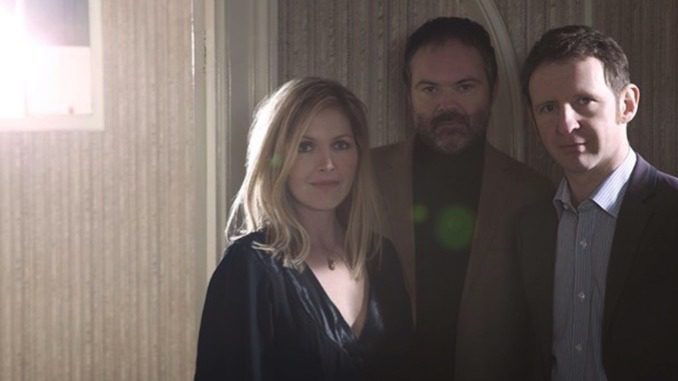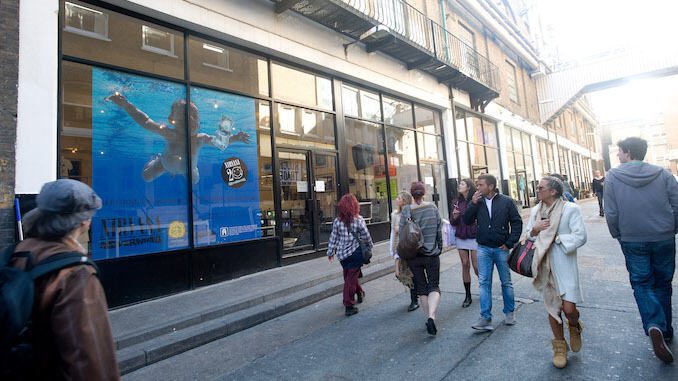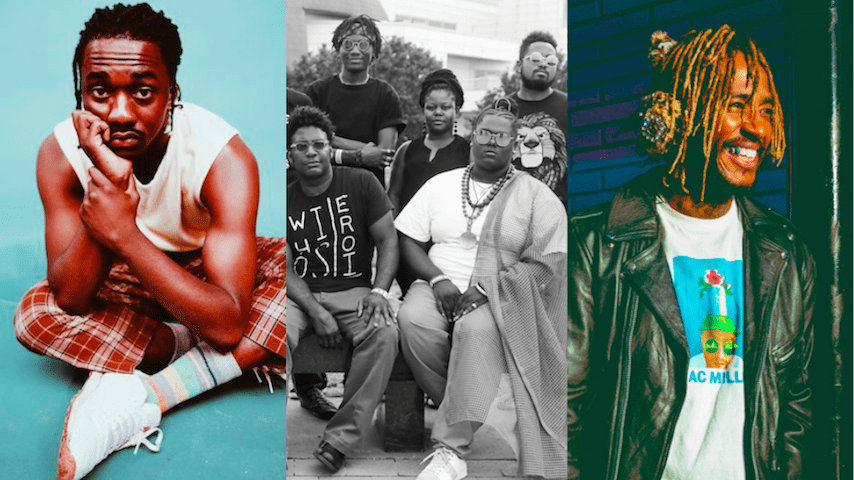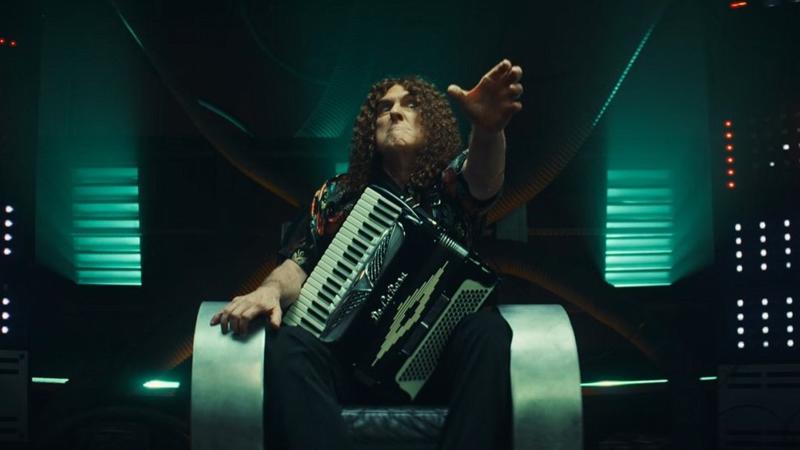When Saint Etienne vocalist Sarah Cracknell phoned a week ago to discuss her band’s experimental, sample-driven new I’ve Been Trying to Tell You album (out today, Sept. 10), has her own list of interview questions, as well, like how I’m doing out in San Francisco, what the headlines held regarding the California forest fires, the flash floods claiming lives across America, the Handmaid’s Tale-regressive abortion laws catapulting Texas back to the stone age as Afghani women are simultaneously being sent there, too, and finally, what other British artists I’ve been interviewing during the pandemic. After rattling off a few favorites, she brightens at the mention of one mutual friend, in particular. “I like the fact that you spoke to Ed Harcourt—he lives down the road, actually, about 20 minutes away, and I just love Ed,” she says, already well-aware of his new side project Loup Garoux, home-recorded in his own backyard Wolf Cabin Studio. And just like that, suddenly the world doesn’t seem so small, bleak and hopeless, despite the still-rising U.S. Covid death toll of 650,000 and counting.
Cracknell was well-aware of Loup Garoux and other current activities in the Harcout household. “They never stop, he and Gita, his wife,” she declares proudly of her intrepid musical neighbors. “And Gita [Harcourt-Smith, nee Langley] has the Cruel Hearts Club, because she’s got a load of beautiful sisters [known separately as The Langley Sisters] and they all went to the London College of Music. So they’re all very gifted, and they play cellos and violins and guitars, everything, and they’re always very active and busy, as well. So they’re a very musical family, her and Ed.” It’s with slight tinge of reluctance, actually, that the affable Cracknell returns to talking about textural new Tell You pieces like “Penlop,” “Broad River” and “Pond House,” which don’t follow strict song structures, but instead weave her diaphanous voice like ribbons across textures created remotely by fellow band members Bob Stanley and Pete Wiggs. Fans haven’t heard an album like it since the trio’s sample-friendly So Tough back in 1993, says the singer, who is also celebrating the 30th anniversary of Saint Etienne’s house-inspired Foxbase Alpha this year.
Additionally, last weekend, there were special London BFI screenings of The Films of Saint Etienne by Alasdair McLellan, who combined videos linked to each new album track into a 50-minute, impressionistic feature all its own, complemented by a folio of equally vivid still photographs. Cracknell, at a remarkably youthful 54, may not want to admit that her music can motivate other artists so decisively, but it does, and eventually, she gets around to discussing it with Paste.
Paste: So you’ve spent the pandemic out in Oxford?
Sarah Cracknell: Yeah. I’ve been at home with my two teenage sons and my husband, Martin [Kelly, former Heavenly Records founder and current entrepreneur]. And it’s really, really quiet where we are, so during the full-on lockdown, especially at the beginning, it felt quite new and exciting, quite fun, even. We plowed our way through video box sets and things like that. And then we were released for a while, and then we went back into lockdown, and that’s when it got a bit like, “Ugh. God.” It really got a bit tricky. But anyway, now it’s fine.
Paste: Since you’re in the country, did you have any wild animals stopping by?
Cracknell: Oh, God—we get everything. We get deer, and there are bulls in the field that’s next to us, and we used to get tons of mice, but now our cat kills them all. And I saw a massive snake the other day, which is really unusual here, but the cat got it, too. I looked out the window, thinking, “What’s she got? Maybe it’s another mouse!” But I wound up screaming, “Snake! She’s got a snake!” It was only a grass snake, but it was huge—really long with a big, fat body, so we thought it might have been living under our shed and was maybe 20-odd years old. But our cat, she finally dragged it out.
Paste: Or it came out wondering where its cornucopia of mice had gone. Did you pick up any new hobbies along the way?
Cracknell: Oh, God no. I’m rubbish at anything like that. And it is weird, isn’t it? I’m creative in other ways, but I cannot paint or draw. So I was really bad about that—I didn’t really find any new hobbies apart from watching TV. I did walk quite a bit, and did a bit of outdoor swimming, but that was it, really. But like I said, it was alright the first time, but the second time we went into a big lockdown, it was so much harder, because you’d gotten a taste of getting out and seeing people. So I think it’s just about seeing people. It’s really hard not to see people.
Paste: Families have reported that young children adapted to lockdown fine, but older teens didn’t as readily.
Cracknell: Well, I’m lucky that I have two teenage boys, and they get on really well. And they’re quite close in age, so they kind of had each other. But I’ve got loads of friends who’ve got teenagers who are having a miserable time. And then I’ve got other friends who’ve got teenagers who went off to university, and then they were locked down in their halls of residence, which was not the experience they were expecting at all.
Paste: But you still stayed in touch with everyone?
Cracknell: Well, I’m not someone who likes talking on the phone normally. But during the lockdown here, I was ringing everybody up and having long chats with people, and it was really nice, actually, that reconnecting with people, when I would normally just send a few texts and meet them for a few drinks in a group. But to actually be one-on-one on the phone, when they’ve got nothing to do, and I’ve got nothing to do? It was actually really good for me.
Paste: What did you learn about yourself in the process?
Cracknell: I suppose I learned that I can be quite solitary. I kind of knew that anyway, to be honest, because I’m an only child, so I’m very happy on my own, very happy being quite solitary. And that just put the rubber stamp on it, that I’m quite good at it, actually. I think my husband struggled with it more, because he likes being out. He’s much more sociable than I. And he’s our manager, and he used to run Heavenly Records, and he still has Heavenly Publishing and he has a film company. But he’s one of those people who likes to go out a lot, so I drive him mad because he’ll say, “Let’s go to this gig on the other side of London!” And he says I pull a face. I don’t know what the face looks like, but I think he should take a picture of it. But apparently, I pull a kind of “What? Why?” kind of face. But he’ll go all the way to East London, and it will take him over two hours to get there, just to see a gig. And I just can’t do it. I don’t want to. And I find, at the moment—because we’re in this country— that you can go to a shop without a mask, you can go all over the place without a mask. But I just don’t. So sometimes, I’ll be in a shop, and I’m the only one. And I’ll think, “Why are people looking at me? Is my hair nice today?” But no, they’re looking at me because I’ve got my mask on. I mean, there are other people like me, quite a lot of them. But it’s just that sometimes I’m the only one.
Paste: Your new album title I’ve Been Trying to Tell You works on several levels. For years in my writing, I’ve been quoting everything from the book Ishmael to climate-change headlines to underscore the fact that man, in thinking he’s the end product of evolution, has basically doomed himself to extinction. And there will be no safe place to run that’s free from fires, floods, tornadoes, hurricanes and coastal erosion. We’ve been trying to tell you.
Cracknell: Oh yeah. I know this woman, she’s really lovely, and she’s got younger kids. But her 14-year-old teenage boy, she found him crying his eyes out, and she was going, “What’s the matter?” And it was all about how frightened he was about the future, and about climate change and about wars and the pandemic and the government. It was horrible, and my friend said she wished she’d never had the news on. I mean, you put the news on and you think that your children are not absorbing it, but this kid was. And she felt so sorry for him, but she said, “What can I tell him?” And there was another hurricane in New Orleans, and a million people without power, and they’d only just got their shit back together, you know? It’s awful. Boy, this is really a doom-y conversation!
Paste: So you were just getting lost in bygone Britpop-era reverie on this album, basically? Back when Labour was in, Boris wasn’t.
Cracknell: Yeah, exactly. I think we were just thinking about how you can get into the idea that there was this great change, and with it brilliant things are going to happen! And some really good things did happen, but not everything we expected happened. So it’s about optimism, but optimism that’s a little bit unfounded, you know? And you kind of remember the good bits and that feeling. So the album is about sort of misremembering things.
Paste: And that’s a recent popular literary device, in Gone Girl, The Girl on the Train—the unreliable narrator.
Cracknell: Yeah. Absolutely. And it is a thing, isn’t it? It is a real thing. Or well, it certainly is for me, I’ll tell you that. I think your memory is an unreliable narrator. You remember things, and then you talk about them, and as you talk about them, they get skewed by that other person’s view on that time or that thing, and then you go on, until it’s like Chinese whispers, isn’t it?
Paste: And I’m thinking, since you’ve got the band manager living with you, would he elbow you in the morning, like, “C’mon! Let’s get a new Saint Etienne album together!”
Cracknell: It is a bit of a nightmare, quite frankly. Or it’s not ideal—let’s put it that way. But with this record, we basically had another record that we’d been working on that was studio-based, and we’d been working in a small studio in Finsbury Park. And then the pandemic hit and we couldn’t go there anymore. But in the meantime, Bob had started talking to us both about some ideas of that kind of thing that was happening, particularly in America, of people getting old songs and just messing them up, and creating these little films and videos to go with them. So he got interested in that, and started talking to us about it. And it really appealed to us because there was nothing we could do together in the studio, and also, we’d had so many records recently with very strong song structures— they’ve got verses and choruses and things like that. So I think it was really fun to do something that involved samples, which, generally speaking, we hadn’t really done since So Tough. We hadn’t done an album that’s predominantly sample-based. And I really loved it, since I was just doing vocals here at home and my youngest son is really useful at things like recording. And thank goodness, because we wouldn’t have an album if it wasn’t for him. He writes his own songs and plays his own music, but he’s got Logic Pro and all that and he’s very handy with all these fancy mics and everything. And there was another lovely guy called Gus [Bousfield, film and TV composer] who was coming up with ideas with Bob, because Bob’s in West Yorkshire now, basically, and Pete lives in Hove, so we were really far away from each other. So they would send me ideas, and I would come up with bits of melody and words, and some things that sounded like words but weren’t really words—that sort of thing. And then I’d send it all back, and they’d change stuff around and do things with it. It was very liberating, very freeing. And I really enjoyed the whole process, because I wasn’t under that normal constraint of writing a song. And I like writing songs. But it was nice to do something different. Where the vocals aren’t the focal point—they were just a part of the music. It was really good fun. I loved it.
Paste: So there’s another nearly finished Saint Etienne album in the pipeline then?
Cracknell: Yeah. And I’d say, to be realistic about it, it’s probably 2/3 of the way there. But now I think we might even get those songs and rethink how we want to approach it. Because—and this is just me talking, and I think Bob would agree with me—I don’t think it’s necessarily the right thing to do to suddenly go back to really full-formed songs again. I think some kind of segue, some kind of hybrid of the two things might be good. I don’t know—we’ll see. If we even get to do another record, that is. Who knows?
Paste: Did you come out of the whole experience cheered up? Reinvigorated?
Cracknell: Yeah, actually! Yeah! I think we did. Right around track four, I was thinking, “This is great! I love this!” And even the grumpy old manager, my husband, said, “This is great!” And he doesn’t normally say things like that, you know. And then because Alasdair was involved, after we’d done about three or four songs, he was sending us stuff that he had made to go with the songs, and it was really exciting. I mean to have someone as creative as he is, and who gets us as much as he does, sending us these beautiful images and beautiful sections of films, it was really exciting.
Paste: And he turned into a whole film that’s premiering in London tomorrow, right?
Cracknell: That’s right! It’s at the NFT1, the BFI’s National Film Theatre—its their big cinema on the Southbank in London. And they’re making me do a Q&A. And I hate doing Q&As. But yeah—he’s really enhanced the whole thing. But I think for me, I can’t say where other people will, but I like it. And I love what he’s done, but I also think that together, it makes something really beautiful. But it’s funny—one of my goddaughters, who’s lovely, and she’s 28 now—she sent me an email about the premiere, going, “Oh, dear! What should I wear? Should I dress up?” I think she thought there was going to be a red carpet. But I said, “No, don’t worry—just come as you are. I really don’t think there’s going to be a red carpet there.” Or anywhere else, for that matter, for a long, long time!




